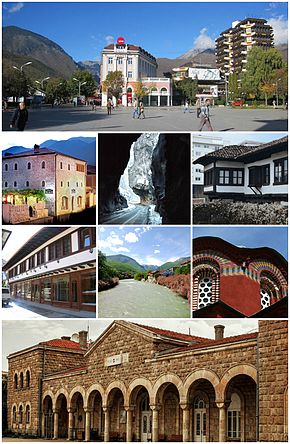Pejë
|
Peć Peja or Pejë (Albanian) Пећ/Peć (Serbian) |
|
|---|---|
| City and municipality | |

From top (left to right):
Peć city center, Zenel Beg Tower (Kulla), Rugova Canyon, Ethnological Museum, Old Bazaar, Bistrica River, Patriarchal Monastery of Peć and the train station of Peć. |
|
| Location in Kosovo | |
| Coordinates: 42°39′N 20°18′E / 42.650°N 20.300°ECoordinates: 42°39′N 20°18′E / 42.650°N 20.300°E | |
| Country | Kosovo |
| District | District of Peć |
| Government | |
| • Mayor | Gazmend Muhaxheri |
| Area | |
| • City and municipality | 603 km2 (233 sq mi) |
| • Urban | 14,008 km2 (5,409 sq mi) |
| • Metro | 21 km2 (8 sq mi) |
| Elevation | 550 m (1,800 ft) |
| Population (2014) | |
| • City and municipality | 97,776 |
| • Density | 160/km2 (420/sq mi) |
| • Metro | 60,000 |
| As of 2009[update] | |
| Time zone | CET (UTC+1) |
| • Summer (DST) | CEST (UTC+2) |
| ZIP code | 30000 |
| Area code(s) | +383 39 |
| Vehicle registration | 03 |
| Website | Municipality of Peć |
Peć (in Serbian, Пећ) or Peja (in Albanian, Pejë) is a city and municipality in western Kosovo, and the administrative centre of the homonymous district. The municipality covers an area of 602 km2 (232 sq mi), including the city of Peć and 95 villages; it is divided into 28 territorial communities. As of 2014[update], the whole municipality has a population of approximately 97,776, of which ca. 60,000 live in the city of Peć.
Geographically, it is located in a important location on the Peć Bistrica, a tributary of the White Drin to the east of the Prokletije Mountains. The Rugova Canyon is one of Europe's longest and deepest canyons and is about three kilometres from the city of Peć. The city is located some 250 kilometres (155 miles) north of Tirana, Albania, 150 kilometres (93 miles) north-west of Skopje, Republic of Macedonia, 85 kilometres (52 miles) west of Pristina, Kosovo and some 280 kilometres (173 miles) east of Podgorica, Montenegro.
In medieval times the city was the seat of the Serbian Orthodox Church in 1346. Later in 1899, the Albanian political organization, League of Peja, was established in the city.
In Serbian, peć means "furnace" or "cave", and its name is probably connected with nearby caves in the Rugova Canyon which served as hermit cells for Serbian Orthodox monks. In medieval Ragusan documents, the Serbian name of the city (Peć, lit. "furnace") is sometimes translated as Forno, meaning "furnace" in Italian. During Ottoman rule, it was known as Ottoman Turkish İpek (ايپك). The Albanian name's definite form is Peja and the indefinite Pejë. Other names of the city include Latin Pescium and Greek Episkion (Επισκιον).
...
Wikipedia

